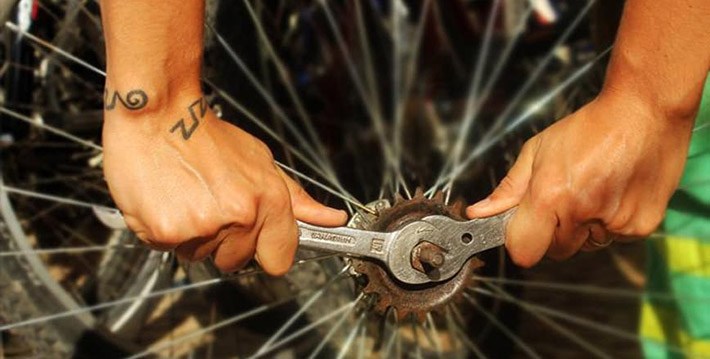 Photo by Henry A. Pérez / El Toque.
Photo by Henry A. Pérez / El Toque.
Bicycle logic
HAVANA – I saw a poster a few weeks back that later showed up on the social networks. It read: “Your virginity’s silent thief.”
At first it made me laugh…
When I was a little girl my father (and probably most parents during the nineties in Cuba) would travel long distances by bicycle through the city with me on the back of the bike. At first I sat in a small, wooden chair painted in some “feminine” color that was installed on the top tube of the frame of the bike. And then when I became a little older, they placed me in back, on a grill, where my mother would put a small cushion so that I would travel more comfortably.
That’s how we went everywhere: to family visits, consultations with doctors or just about any place. I always sat in back on that cushioned, metal seat, and not bothered by the sweat my father’s pedaling produced; I was happy, unaware of the sacrifices made by the families of those years.
“Careful, the child’s asleep!” someone would yell at my father, a cyclist with few other options, while I, feeling safe and relaxed, snoozed against his back. I remember also having stared down at those spots of iodine on my feet because of the wounds produced by the spokes of the rear wheel every time my flesh and its metal met.
One day there arrived from Matanzas a rusty bundle of red scrap that resembled a small bicycle — the rust and the paint undistinguishable. With much patience, not common in my father, he put it together — sanding, greasing and painting it for me, which became my liberation from lace dresses and hair bows. Also showing great patience my father taught me to drive it: to turn, brake and maintain my balance. From there on in I felt I could go anywhere. My mother hated it; I loved it.
For me the bicycle was never a symptom of crisis (Cuba’s special period in the 90s), it was a path towards independence that I longed for since I had the use of reason. Riding it never meant being less of a girl, or woman; It was a right with which I was born, for which, thanks to many before me, I did not have to fight for. I have never ridden sideways on a horse, a motorcycle or a rear grill just because opening of legs had a sexual connotation for men; it has always been my choice. And as an adult when I again had a bicycle that I used to travel to the university and then to work, instead of going to play in a park with the children of my neighborhood, I was more aware of my place in the world, in my country, and of course on the road. I was on the street next to all the male drivers.
I say this because I live on this Island where there is an entire previous generation for which bicycles are irremediably connected to a socioeconomic crisis that claimed thousands of nerves, proteins, calories and empty plates. But it is not the case of the young, who in fact have begun to use it more and more, and not necessarily because of scarcity. That’s why when I saw the poster, I laughed.

Then, switching to a slow motion sequence of nervous giggles, I thought about Iranian women, whom Ayatollah Khamenei, Iran’s main religious leader, has banned from riding bicycles because they “attract the attention of men and expose society to corruption.” It is, again, a man — with the Middle Ages in his soul — dictating what women can or can not do based on what men desire. That same night when I told my friend about the aforementioned poster, her indignation reminded me of all the patriotic Cuban women that make up a part of our history. I tried to imagine myself in their place and I had to catch my breath.
“I only use means of transportation that do not affect my virginity or my relationship with God,” the small black and white sign also said, with an image in the background of a girl on a bicycle with her legs splayed horizontally and in the air.
“One thing is what may affect my health and another is that there may be some prejudice about the situation,” says a female doctor friend. In medicine, if there are no studies, if there is no data, there is no hypothesis and it is therefore unlikely that there be scientific evidence.” Four other doctors I asked answered exactly the same way.
If we research “the use of bicycles and female sexuality” in Google Scholar and search only for the results of the year 2018, one will find more than 800 entries that appear for December. Not a single one, not even those who were the subject of the articles and essays, or were mentioned at all, contains any reference to the possibility that the use of a bicycle could “steal” a woman’s virginity.
In the first place because those who steal a woman’s virginity are rapists, not lovers. Let’s not confuse terminologies, although many parents and priests might insist. But also because an accident that may cause the loss of the connective-fibroelastic skeleton, which is merely a membrane without a physiological function known as a hymen, does not imply the loss of virginity as a consequence.
Virginity as a trophy, on the other hand, is the height of indecency in a brothel, where you find a contraband of fresh meat and a seal of guarantee. It’s not as simple as riding a bicycle; it is hypocritical and cruel.
Postscript: By the way, the poster’s creator seems to be the Renaissance Pentecostal Church, “a movement that preaches the Christian faith and launched on a virtual path under the direction of prophet and pastor Elías Ramírez,” who I found no trace of in Cuba, although he did appear in several Latin American countries. But after seeing so many people asking for the removal of equality in marriage in Cuba’s next Constitution based on the same concept of decency and a very similar interpretation of the Bible … It seems more appropriate to ride a bicycle and also hang a bright multicolored flag that reads: #68va. (Article 68 in Cuba’s proposed new constitution redefines marriage as the union between two people, which would open the possibility that same-sex couples formalize their status before the law. #68va is translated to support for Article 68.)


